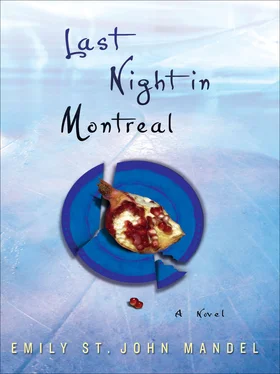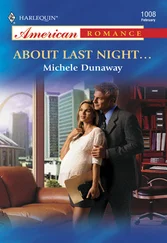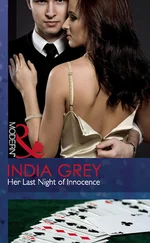Once the dinner was laid out on the table, each one less dinnerlike than the one before, once Michaela and her father were seated, her mother glanced expectantly from one to the other until they started eating. Then she brought out the newspaper and proceeded to ignore both of them.
“Elaine,” Christopher said.
“I’m sorry, am I being rude?” She put the paper down. “How was work, darling?” She was like an actress impersonating a wife. Something shone terribly in her eyes in those days; she had the look of a woman with a permanent fever. It seemed that she almost never went to sleep.
“Very productive,” her father said. He no longer recognized this as the life they’d left the circus for, and he felt that there’d been some kind of a bait and switch.
“Good,” her mother said, and picked up the paper again.
In the silence after that moment Michaela tried to eat as quickly as possible, or as little as possible, or both; she wanted to leave the table as fast as she could. Her mother put the paper down.
“But no one asked me about my day!” she said. “Don’t you want to know what I did?”
“Please,” said her father, “not in front of the kid.” He didn’t look at Michaela, although she stared at his face.
“Well,” she said, “never mind, then. It doesn’t matter what I did.”
(Notes on the fragility of family, written in his other notebook much later that night: Everything matters. Everything matters. Do not ever pretend that it doesn’t matter what you did. ) But instead of saying that he just said her name. She snapped at him and the conversation was carried into the kitchen, where it billowed up quickly and raged into a storm. This was the point in the evening when Michaela always left the table. She went upstairs to her bedroom and did homework or drew sketches involving tightropes and great expanses of air. She was plotting the distance to the nearest tree from her bedroom window, although this was during a period in her life when she still knew better than to try that kind of thing; no one at the circus school was allowed to walk on a tightrope without a safety net or a spotter at the very least, depending on the height of the rope, and there was a time in her life when she still understood why this was. The battle in the kitchen was loud but abstract; it was impossible to make out the content of what either of her parents was saying, only the tenor of shrieked accusations and counterattacks. There was an evening when she wandered into her parents’ bedroom, perhaps in search of silence, or of clues. Her mother’s clothes were scattered here and there. Her father’s leather bag was lying at the foot of the bed. In the months since she’d sprained her ankle at the circus school she had gone through all of her father’s files that she could find; the case he was obsessed with held a strange fascination for her.
Her father’s bag held very little of interest: a wallet, a comb, an autobiography of an LAPD hostage negotiator, a beat-up Montreal subway map, a road atlas for the Southwestern United States, half a pack of DuMaurier cigarettes. But what was strange to her was that it contained two Bibles, each with a bookmark protruding from the center pages. To the best of her recollection she had never attended a church service, and she had always been under the impression that her parents were atheists. She opened the first Bible to the bookmark, and it took a moment to make out the scrawled message in the dim glow cast by the streetlight outside the window. Stop looking for me. I’m not missing; I do not want to be found. I wish to remain vanishing. I don’t want to go home. — Lilia.
Her breath caught in her throat. No, the missing girl’s mother said in a grainy 1987 videotape of a long-archived television episode, I wish I could forget her. The pitch of the argument downstairs was changing, moving closer to the foot of the stairs. She tore the page from the Bible, folded it quickly, put it in her pocket and left the room.
In the times when Lilia wasn’t hiding in the backseat of the car, when there was no one else on the road and the breeze through the passenger-side window was perfect, when she could forget that she was being chased and that she might be found someday, when it was only her father and the radio and the highway — in these times Lilia and her father could talk for hours, and life seemed gorgeous and magnificent and safe. Safety is a car driving quickly away.
He wasn’t content with showing her the country: he wanted to show her what he saw in it, to share his private love affair with the sheer beauty of all the details that he could never stop noticing no matter how long he traveled or how fast. When he talked about details — flowers, fences, individual buildings, the poetry hidden in the names of towns — Lilia felt her heart swelling up with an awkward adoration for it all. But she never felt at ease in the world. It couldn’t be claimed that she was really a part of it, and from the specific night when her memories began (ice against window, lost bunny, snow), the traditions of the world were foreign to her. She picked up what she could from books and television shows, noting carefully the existence of two-parent families, houses, schools, family dogs, memorizing intriguingly home-specific phrases like latchkey kid and back garden and state-of-the-art kitchen appliance and basement. She moved over the surface of life the way figure skaters move, fast and choreographed, but she never broke through the ice, she never pierced the surface and descended into those awful beautiful waters, she was never submerged and she never learned to swim in those currents, these currents: all the shadows and light and splendorous horrors that make up the riptides of life on earth.
At the gas stations her father bought magazines: the NewYorker, Newsweek, Science Times . These she studied carefully, anthropologically, for information on the world she traveled through. Or he’d buy a book written in a language that she was supposed to be learning at the time (Spanish, Italian, German) and set parameters: By the time we reach St. Louis, kiddo, I’d like a written translation of the first half page. And she’d bend feverishly over the relevant split-language dictionary (English-German, Español-Inglés, Italiana-Inglese), and he’d give warnings— Ten miles, kiddo, eight, six, time. And at the motel that night he’d go over the page with a red pencil while she pretended not to care and stared coolly at the television set. It flickered bluely in a thousand motel rooms while she watched it and half expected to see herself there on the screen.
When she was younger she used to tell herself, with some smugness, that some people vanish forever and never are found. Until the interview on Unsolved Cases, she still believed herself to be one of them. It wasn’t that she ceased to be happy after she saw herself on television; it was that after she saw herself on television she was aware that someday all of this would end.
“Dad,” Michaela said once, standing at the foot of the stairs while he worked at the dining room table, “can I run away and join the circus?”
Christopher looked up, blinking. He had hardly been home since the page had been torn from the oldest Bible; he couldn’t look at his wife without thinking about it, without wondering how she could sabotage him so completely, and so had taken to avoiding her altogether. Michaela looked different somehow, and then he realized that she’d gotten a haircut since the last time he’d really looked at her.
Читать дальше












